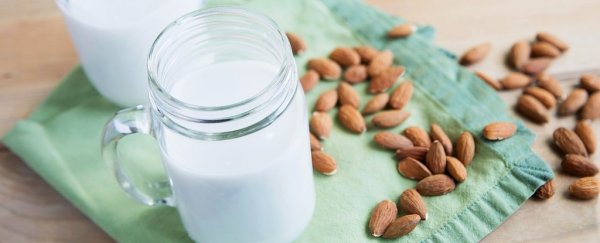All those liquids made out of soy, almond, rice, coconut or oats won't be called milk anymore, if the US Food and Drug Administration (FDA) has its way.
According to the government body's definition, the word "milk" only refers to lactate from an animal, preferably a cow. And whatever was squeezed out of that soybean is not it.
The name currently used to describe and market plant-based milk substitutes was questioned by FDA commissioner Scott Gottlieb at the Politico Pro Summit earlier this week, CNN reported.
More specifically, he noted that the government is probably not adequately enforcing its own standard for the way the word ought to be used on food packaging.
That definition in the Code of Federal Regulations is is very rigid: "Milk is the lacteal secretion, practically free from colostrum, obtained by the complete milking of one or more healthy cows."
(It's worth noting here that, even though it's not included in this definition, goat's milk and buffalo milk are still allowed to be called milk.)
Vegan substitutes are absolutely not obtained by milking cows. Soy milk is made by soaking and grinding soybeans; almond milk is made by blending and straining almonds (you can do it yourself at home).
But the FDA has been under pressure from the National Milk Producers Federation, which believes that milk alternatives using the word "milk" are misleading to consumers. And it's not just milk - it's all dairy.
"The existing Standards of Identity clearly state that terms like 'milk', 'cheese', 'yogurt', 'ice cream', etc. apply to products made from the milk of cows," the organisation wrote in a FAQ about the issue.
"Non-dairy alternatives that mimic these products do not meet those standards of identity, and National Milk Producers Federation asked the FDA to enforce their labeling regulations."
There are many reasons for drinking plant-based milk alternatives over cow's milk, including allergies, lactose intolerance, ethical reasons, and even just a flavour preference.
Given their plant-based origins, it makes sense that the nutritional profile of soy or almond milk would not be the same as that of cow's milk - manufacturers often alter it by boosting with supplements such as calcium, B12 and D.
Nevertheless, the Federation believes that milk alternatives are trying to piggyback off milk's positive and healthy reputation, senior vice president of communications Chris Galen told CNN.
In other words, "'milk' sounds better than 'nut juice'."
However, there are other ways to go about it. As the Federation noted in the aforementioned FAQ, there are alternatives on the market that don't use the word 'milk.'
"There are plant-based beverages that use terms like 'soy drink,' 'rice beverage,' etc. There are also plant-based foods that use terms like 'cultured soy' or 'non-dairy frozen dessert,' instead of 'soy yogurt' or 'rice ice cream,' respectively."
On the other hand, terms like soy milk and coconut milk are common verbiage in the US, and consumers are savvy enough to know the difference, said Michael Neuwirth of soy milk manufacturer Danone.
"Dairy and plant-based products are clearly labeled with nutrition facts so people know what's in the products and can choose the ones that best fit their dietary needs and preferences," he said. "We do not believe further labeling standards are necessary."
Where is the FDA going to draw the line? It's hard to say at this point. Although FDA spokesperson Deborah Kotz did note that the Code definition may be a bit out of date.
"Many (standards of identity) have existed for decades," she told the CNN.
"At the time they were developed, the FDA could not foresee the types of new products that would be developed in the future using different ingredients and/or manufacturing processes."
